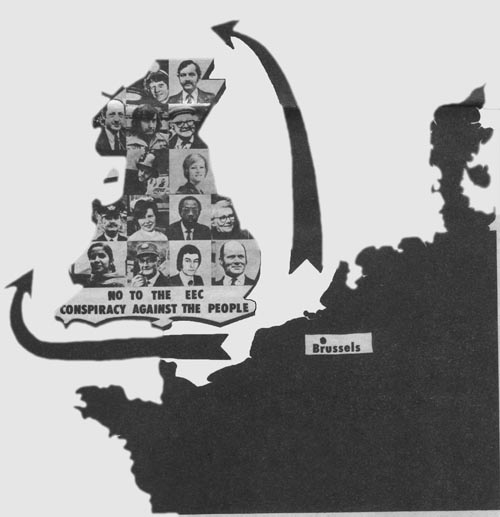In our final article to mark the 40th anniversary of the CPBML by looking at the past four decades through the eyes of Workers and its predecessor, The Worker, we look at the fight against the European Union.
No to the Common Market, the EEC, the European Union!
WORKERS, DECEMBER 2008 ISSUE

|
From Edward Heath’s flirtation with the EEC in the early 1970s, our party discerned the dangers to our national sovereignty and to our class’s ability to influence the direction of our country. Later, in the run-up to the 1975 referendum on Common Market entry, The Worker of 15 May combined a powerful graphic of the EEC encircling Britain with a large campaigning heading - ‘Common Market NO!’ The editorial opened:
“Capitalism is aggressive and expansive or it is nothing. The Common Market is the way the declining capitalist powers of western Europe in their abysmal stupidity believe they can create a new imperialism.”
A number of articles in the paper covered different menacing aspects of the EEC. ‘Mobility of Capital’ stated “The key to EEC plans for industry in Europe hinges on Article 67 of the Treaty of Rome. This provides that ‘…Member states shall progressively abolish between themselves all restrictions on the movement of capital’ .”
The ‘Common Market means migration’ article pointed out:
“The ‘freedom of movement’ and ‘mobility of labour’ protected by the Common Market is as old as capitalism itself. Wage labourers have always had the ‘right’, when robbed of their livelihood, to seek work elsewhere or else stay put and starve.” The article concluded: “A fine thing, ‘freedom to move’. Far finer, the freedom not to have to!”
Two weeks later on 29 May 1975, The Worker’s lead article, headlined ‘No to EEC’, identified the threats to our class likely to emanate from European capitalist integration:
“We, the CPBML, are in favour of the workers of Europe fighting our common class enemy, of aiding one another in revolution.
But we are opposed to the Common Market.

|
| Graphic from The Worker, 15 May 1975 |
The EEC, though purporting to be a fraternity of nations, is merely a community of monopoly capitalist states, dressed up in the clothes and concealed in the jargon of a false internationalism – purposely to confuse the response of organised workers. It is the internationalism of big business arraigned against the power of workers throughout Europe. Its motto is the free movement of capital and labour; firms, now multi-national, take European-wide decisions, and in their wake come rationalizations, mergers, closures, depressed regions and an enlarged army of unemployed.
…Mobility of labour across the continent is seen as a tactic to break the unity of our class, to dilute the level of its trade union organization (still unique in Europe) and import the worst features of industrial relations current in the EEC.”
In the November 2000 edition of Workers, we warned that the latest political trends in the European Union of joining the euro and closer constitutional and political integration would have dire consequences and that we should have a referendum to reject joining the euro. A highly edited version follows:
“BRITAIN YES, EURO NO
The drive towards creating a single European state motivates everything that the European Union’s leaders do. These leaders, including Blair and Brown, have decided that Britain should join the euro and that Britain should become part of a single European state. “Monetary union is the motor of European integration” as Jean-Luc Dehaene, former Prime Minister of Belgium, said.
The EU’s leaders aim to form a single state, with a single currency, a single government, a single frontier, a single army, a single flag, a single system of criminal law, a single system of tax and spending, and a single citizenship. Every EU initiative follows a federalist agenda, moving ever towards merging Europe’s independent states into a single European state. The goal is political unification, the unification of separate states into a single political entity. …..
Britain
The euro’s supporters across the Continent all openly support these policies of political integration. Only in Britain do they hide the obvious truth, because they fear that if they admitted it, even more of us would oppose entering the euro. So they play ‘softly, softly, catchee monkey’ and claim that their decision to join the euro is solely an economic judgment...
Our trade unions, particularly those in manufacturing, have traditionally backed Britain’s manufacturing industry, recognizing that it is vital to Britain’s future. How can they then argue for a policy that would mean dissolving and merging Britain into an EU state?
The Danish people have voted to keep their national currency: that was their decision, as it would have been had they voted to end the krone and adopt the euro. It does not affect us here. We must make our own decision, and that must be to insist that any British Government rejects Economic and Monetary Union. We should call for a referendum now, to say NO to the euro and YES to a prosperous independent Britain.”